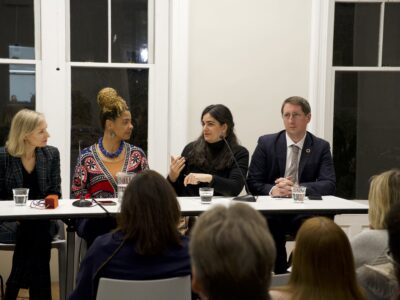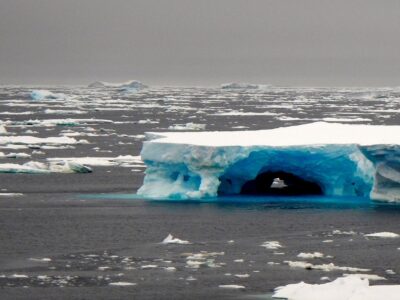
Thousands of people from all over the world marched in Rome this week to lend support to the pope’s message on climate change. On June 18, Pope Francis released his encyclical entitled “Laudato Si’,” which means “Praise be to you.” The title comes from a canticle written by Saint Francis of Assisi, whose life demonstrated “how inseparable the bond is between concern for nature, justice for the poor, commitment to society, and interior peace,” wrote the pope.
An encyclical is formally a letter of instruction to be circulated among bishops; Pope Francis means this one to be for everyone. The broad-ranging document warns that we are destroying our common home and face an immense and urgent challenge to protect it. But it goes far beyond just the subject of climate change, calling for a holistic and sustainable future.
The encyclical acknowledges that greenhouse gases from human activities are warming the planet, causing sea levels to rise and increasing the frequency of extreme weather events. Carbon dioxide pollution from the burning of fossil fuels is acidifying the ocean, threatening the marine food chain.

Deforestation and water shortages are on the increase and many of the world’s poor do not have access to clean drinking water. We are plundering natural resources and destroying biodiversity. Exposure to pollution from transportation, industry and waste result in myriad health hazards and premature deaths, especially among the poor.
Climate change has grave environmental, social, economic and political implications, but its worst impacts will be felt by the poor, warns the pope. Many of them live in places affected by global warming, and their subsistent-level lives often depend on ecosystem resources.

The pope blames climate change and the environmental destruction on our market-based global system, founded on the idea that increased profits can solve most problems, and on rich countries, whose throw-away and consumption–propelled lifestyles drive the above conditions.
And while science and technology have given humanity tremendous power, “our immense technological development has not been accompanied by a development in human responsibility, values and conscience” or the obligation to assess its potentially negative effects on mankind.
“The pope dares people in our position to meet him halfway, to take the work we do and check it against his criteria of rescuing the abandoned and forgotten of the earth,” said Robert Pollack, professor of biological sciences and director of the Research Cluster on Science and Subjectivity at Columbia University. “As a scientist, do you really have the right to use government tax money to follow your curiosity with no obligation to the poor? … I’ve been a member of the faculty for many years, and I don’t think we’ve ever talked about this. We have some work to do.”
“The human environment and the natural environment deteriorate together; we cannot adequately combat environmental degradation unless we attend to causes related to human and social degradation,” writes the pope. He calls for policies to reduce carbon emissions (although he does not support carbon credits), phase out fossil fuels, switch to renewable energy, increase energy efficiency, promote recycling, develop sustainable agriculture and ensure universal access to drinking water.

He urges the adoption of enforceable international regulations and a system of governance for the global commons. But he recognizes that we have so far lacked the local leadership to accomplish these things. The failure to reach a global agreement on the environment is evidence that our politics are subject to too many special and economic interests, which overpower the common good in favor of profits.
The idea in Genesis that man is granted “dominion” over the earth, often construed to sanction the despoiling of nature, is an incorrect reading of the Bible, according to the pope. Rather, the Bible instructs mankind to “till and keep” the garden of the world. Communities may take from nature what they need to survive, but they also have a duty to protect the earth for future generations. This responsibility is based on the idea that nature is a revelation of the divine and that every living creature, as part of the universe, is connected.
We cannot, however, have a sense of communion with nature if we cannot care for our fellow human beings. The earth was created by God for all, writes the pope, so in protecting the earth, we must also protect the rights of the poor and underprivileged. We are having so much difficulty meeting the challenge of protecting the earth and its people because of an “ethical and cultural decline” characterized by “rampant individualism” and a “self-centered culture of instant gratification.” Our inability to think seriously about future generations is linked to our inability to think beyond our own immediate interests to consider the poor and disadvantaged.

Progress itself needs to be redefined. “A technological and economic development which does not leave in its wake a better world and an integrally higher quality of life cannot be considered progress,” writes the pope. Many things need to change—above all human beings themselves. Because the actions of individuals matter, the pope encourages us to use less energy, forego plastics, reduce water consumption, take public transportation, care for other living beings, plant trees and realize that material consumption is not enough to give us meaning and joy. Instead, we must return to simplicity, to appreciate small things and be grateful for what we have. Laws will not bring about meaningful lasting change if individuals are not personally transformed as well.
While humans are capable of the worst, the pope recognizes that we are also capable of choosing what is good and starting anew. “We must regain the conviction that we need one another, that we have a shared responsibility for others and the world, and that being good and decent are worth it.”
Not surprisingly, there is resistance to the pope’s message. In a recent interview, Anthony Annett, a climate change and sustainable development advisor at the Earth Institute, explained that resistance in the United States is largely based on a few specifically American phenomena and ideas.
“The most basic reason is the power and influence of the oil, gas and coal lobbies…the U.S. is unique among advanced economies for the ability of big money to influence politics. … The second issue is related, and it is the dominant strain of libertarianism in America. Again, the U.S. is unique in this sense. What you get is a self-centered individualism and an entitlement mentality—I have the right to do whatever I want, and the government better stay away.”
Annett said the “horrible idea of American exceptionalism” is the third issue. “Honestly, what could be less Christian than the idea that God favors some nations over others? The implication is that America is under God’s protection, ordained for prosperity and greatness, to be achieved by using the resources given by God.”
While the encyclical’s overarching view does not delve into politics, the points made have political overtones, and some Republicans don’t quite know how to deal with them. The five Catholic Republican presidential candidates had varied responses. Rick Santorum doesn’t believe the pope should be using his moral authority to talk about climate change at all because he says there are more pressing problems confronting earth. Marco Rubio, who has said he does not believe in manmade global warming, nonetheless said has no problem with the pope reminding us to care for the Earth. Chris Christie admits climate change is real and that humans contribute to it. John Kasich also believes climate change is real and that we need to protect the Earth. And Jeb Bush is concerned about climate change and feels we need to develop a consensus about how to deal with it. However, Republican congressional leaders largely dismissed the pope’s message.
Peter Schlosser, deputy director and director of research of the Earth Institute and a professor of earth and environmental sciences, who was raised Catholic, believes the encyclical could help change people’s minds because, “It is not coming from science, that today some parts of society look at with skepticism and distrust, but from an organization rooted in a faith and belief system.
“From what I understand about the science of decision making, this is where a lot of our motivation to behave comes from, so it’s important to hear about our changing world, its impacts and the need for new ways of being from a new source. … This extends the domain in which these issues are raised and tries to break down the boundaries between different groups.”
Father John S. Rausch, a Kentucky-based priest and coordinator for Appalachian justice education, has been fighting mountaintop removal mining for many years. Because he’s based in coal country, there are people that walk out of church when he preaches about the web of life and the need to care for creation, and he recognizes that some people, because of their economic situations, may be impossible to convert.

“But people now have to confront climate change because this is coming from the head of 1.2 billion people of Catholic faith, it’s their official teaching,” said Rausch. “The encyclical sets the agenda for discussion.”
Environmentalists in other faith communities also embrace the pope’s message. Sister Joan Brown, a Franciscan sister and the executive director of New Mexico Interfaith Power and Light, has been working for many years to educate people about climate change. She helps houses of worship and individuals become energy efficient and switch to renewable energy, and inspires them to “green” their lifestyles and advocate for environmental policies.
“The response to the encyclical from many interfaith leaders is very welcoming,” she noted. “They want to sign on and say yes to these concerns.” The encyclical has also affirmed and deepened her own commitment. “It gives the work a certain joy,” said Brown. “You feel like you’re more in a community—that we’re all in this together.”
“…O God of the poor,
help us to rescue the abandoned and forgotten of this earth,
so precious in your eyes.”
This line in a poem that ends the encyclical was particularly moving to Pollack. “I agree with Jeffrey Sachs (director of the Earth Institute) that we can be smart enough to pull ourselves out of this situation,” he said. “But ultimately we have to care enough about people we will never meet … we have to be good enough to find our way out.”




As a buddhist I see the truths of buddhism with the fact that every living creature serves a minute ecological function, indirectly providing us humans our daily nourishment.
This pope couldn’t have happened along at a better time. Man seems to respond to emergencies, finding energy and unity in facing them together. So, let’s hope.